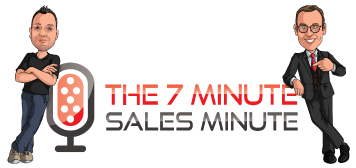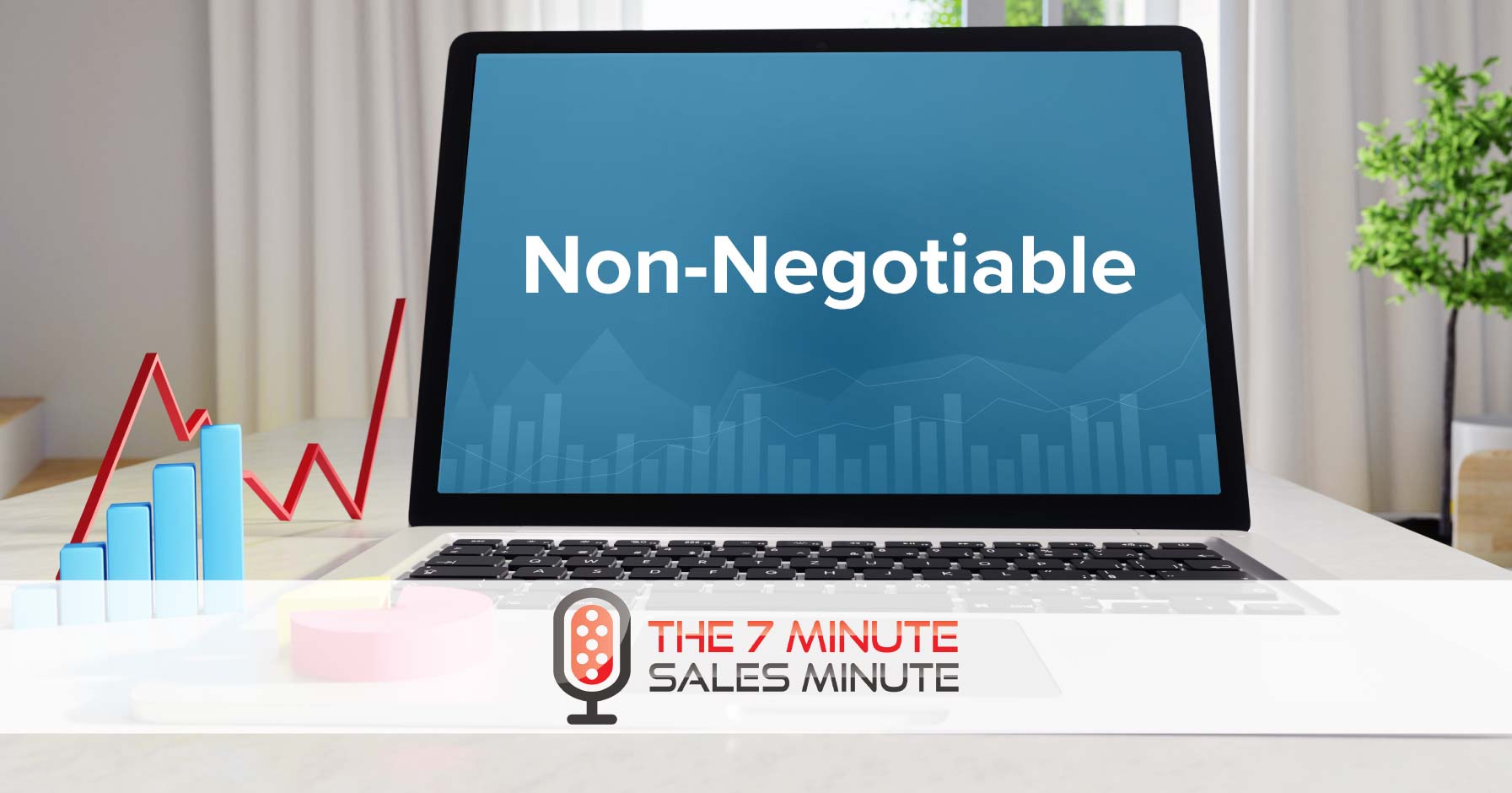
In this episode, the guys continue their guidance on finishing your year on the right foot and setting yourself up for success in the coming year.
Are you doing what it takes?
Read the full transcript
Scott: I’m Scott Fishman.
Jon: I’m Jon Dwoskin.
Scott: This is the Seven Minute Sales Minute.
Jon: Welcome, everybody.
Scott: Hey, Jon, what’s up?
Jon: What’s up, Fish? How you doing?
Scott: Doing great, man. Doing great. Just had another killer workout. I’m sitting here ready to rock.
Jon: Good. Me too, I worked out this morning and I’m ready to go. Let’s get started, shall we?
Scott: Yeah, absolutely. What do you want to talk about this week?
Jon: Whether you have a business plan or don’t have a business plan, what we’re going to talk about today is going to extract from your business plan or give you the fundamental steps to begin a business plan.
Scott: I like it, so the opposite of extract might be inject. It’s either going to be we’re extracting from your business plan or we’re injecting into your business plan.
Jon: Right, exactly. Exactly.
Scott: Very cool.
Jon: Let’s start with extracting. You and I talk to salespeople all the time and they create these business plans and sometimes they put them in a drawer and they never look at them again until the following year when they have to build a business plan. We’ve talked on the Seven Minute Sales Minute many times that a business plan should be a fluid document that you’re looking at on a consistent basis and it’s always evolving and you’re always growing your business plan.
Today, we’re going to talk about how to extract the true leading indicators and the leading activities and the leading priorities that you need to be doing as a salesperson to really grow your business in 2018. The way we’re going to frame this is simply, what are the three leading activities that you as a salesperson need to do every day that are anchored in the core of your business plan to grow your business? That’s what I want to talk about today, Fish.
Scott: Jon, that’s a lot and I love it. A lot of good buzz words in there and I think we could really knock this one out.
Jon: Alright, well, now let’s reverse engineer it and give some fundamentals so it’s not so big of a picture. I read this book, Great By Choice, which is also by Jim Collins who wrote Good to Great, and in it he talks about how you zoom out and then you zoom in. So that’s kind of the zoom out, and now let’s zoom in and reverse engineer.
What is a leading activity? A lot of times people get very confused about that. Not only salespeople, but business people in general. A leading activity is something that drives your business forward. There’s leading activities, or there’s leading indicators and there’s lagging indicators. Lagging indicators are staffed from yesterday, and what you do today to push your business forward is a leading indicator to grow your business. Those are a lot of buzz words, but what we do is we want to take that and create leading activities. Simple, simple, simple. Leading activities that are very specific and measurable to grow your business.
One of the things I see salespeople do is get lost in the minutiae and lost in the weeds and they never have time or find the time to get to their core business. Those are a lot of words to now get back to simplistics.
Scott: I love it. I think if I’m hearing you correctly, is we’re going to use yesterday’s metric adjusted, yesterday’s experience, to help drive our business forward and help us plan out what we’re going to be doing today and tomorrow.
Jon: But we’re really going to use kind of what the ultimate results and goals are because we want to drive to the result. Let’s talk about what a leading activity is. A leading activity typically is, for salespeople, doing three things. They should be on the phone with prospects or clients, at a meeting face-to-face with a client, or on their way to a meeting. I mean, that’s a generic kind of one, two, three for salespeople. What are the activities that a salesperson first and foremost needs to do to grow their business?
Scott: I would say prospecting.
Jon: Okay, so prospecting. It’s very common, a lot of times, for salespeople to say, “I’m going to prospect every day,” or, “I’m going to find some new prospects,” or, “I’m going to go to a networking event and get some prospects.” But, Fish, why don’t you remind everybody what a SMART goal is?
Scott: A SMART goal is something that’s going to be specific, measurable, actionable or attainable (I’ve heard both), relevant, and time-bound.
Jon: Okay.
Scott: Alright.
Jon: Passed the quiz. Alright, sounds good. That’s what we want to do, and I know that it sounds very fundamental, but we’re going back to the fundamentals right now. What I want every salesperson to do is take a pencil and a paper. I’ll give you five seconds to pause this and get your business plan, if you have it. Otherwise, let’s come up with what these leading activities are going to be.
To me, and everybody is going to be a little bit different, let’s start with prospecting. Every salesperson should be prospecting every single day.
Scott: But how?
Jon: You have thoughts on that?
Scott: I think it’s great. I think it’s amazing to say, “Yeah, I’m going to prospect every day,” or, “I’m going to prospect at this time,” or like you said, go to a networking event, but we definitely have to peel back the layers of that onion.
Jon: Correct.
Scott: There has to be a how behind it. Like, how are you actually going to do it? When are you actually going to do it, or else it’s not going to be SMART, as we said.
Jon: Right.
Scott: You always want to make sure that saying we’re going to do something is the equivalent of like a really simple buzz word. Like, yeah, I’m going to get this done, but how? What are we going to do? Because if you don’t have a plan, they say, those who fail to plan, plan to fail, right?
Jon: Right.
Scott: You have to have a plan behind what you’re going to do. Knowing I’m going to prospect from this time to this time, from this pool of prospects, you have to go that deep. You have to go way below the surface on this thing.
Jon: Right. I would suggest that even going deeper as far as saying, if you’re going to say, “I’m going to make 20 calls a day, and five are going to be prospects that I’ve called four times already. Five are going to be prospects that I’ve called six times already. Five are going to be prospects that I’ve never called before, and five are going to be prospects that it’s my second time I’m calling.” Be as specific as you can so you understand how things are compounding and what your metrics and conversion rates are.
I want to know that by the time I call somebody four times, I’m converting it to the next step of my continuum. For prospecting, measure every element of the process of that continuum of the prospecting call. How many calls am I going to make? What are each of those calls going to consist of? Like you said, Fish, and I agree, what time am I going to make those? Am I going to do it in 15-minute chunks? Am I going to sit down for an hour? Then I put that in my calendar and commit to the time to actually prospect without letting everything else – all of the things I think are urgent – get in the way.
My suggestion would be, and we talked about this in the podcast, turn off anything that’s going to be distracting and focus on prospecting. That is the future bloodline of the growth of your business.
Scott: Yes, and like you were saying, measure everything. It’s very important that you are measuring it and you’re actually taking notes on everything you’ve done. If I’ve called client X or prospect X at 10:00 AM for the third time, what did I say on that phone call? Because when I call the fourth time, I don’t want to also call that person at 10:00 AM, and I don’t want to say the exact same thing. I need to have a different in. I need to have a different hook when I make that phone call because, like we’ve talked about before, if I’m just calling you every single day and saying, “Hey, Jon, I’m just calling to check in,” we’re not moving anything forward at all.
Jon: No.
Scott: We have to make sure that we are doing the right things and saying the right things, taking the right actions on every single phone call and making it worthwhile. Otherwise, why the hell are we doing it?
Jon: Amen. Amen. You know, sometimes people complain. Salespeople complain, “Oh, my manager micromanages me,” but that’s bs, because you should be micromanaging yourself. If you micromanage yourself, and you know what your stats and conversions are, then you will find that your manager barely has to manage you.
Scott: Yeah.
Jon: Micromanage yourself and understand every nuance of everything that you do. That’s what the people that are great do. They know every stat. If you don’t know your stats, then how do you know what to do that’s effective for the day to grow your business?
Scott: Right.
Jon: Yeah.
Scott: Jon, you’re touching on something that I think kind of hits home. I’m hitting my chest as I say those things. In the past, I’ve actually complained that I haven’t gotten enough management. I’ve heard people all the time complain like, “Oh, I’m being micromanaged. I got a thumb under me. I got to check in every single time.” I’ve actually complained in the past because I micromanage myself so much that I’m not getting enough from a leader because they know that, “Hey, Fish is kind of hands-off. I don’t need to push him,” but I think I’m missing out on a little bit. I could be that much greater if they just, from the outside looking in, say, “Hey, you know what I noticed, you’re not doing this,” or, “I noticed you could do this a little bit better,” whereas because I’m so hands-off and my business is always there, I could be making more money if they just gave me a little bit more time.
Jon: Yeah.
Scott: I welcome the management.
Jon: You know, that’s a great topic for another podcast because that’s a management issue and a lot of times managers manage to kind of the lowest common denominator to get their bottom people up and to get them to their potential, but what they miss is the people that are actually hitting their potential, getting them beyond that to their next level of potential is actually a lot easier than trying to bring up rocks.
Scott: Yeah, absolutely.
Jon: Yeah.
Scott: If you could increase your top line folks by 10%, it’s going to be greater than increasing your bottom line folks by 40%.
Jon: Yes.
Scott: You’re going to get more results.
Jon: On the flip side, I would say people like you, Fish, and me, and many of you know who listen to this show, I mean, we’ve known each other since high school. We went to college together. I mean, you were always the guy that would finish the test in five minutes and get an A, and I was always the guy that would finish last and get a B- … hopefully. You know, you are a quick study, but people like you I think need to put themselves out there. I don’t know if you are or not, but just say like, “Hey, I need your guidance, Mr./Mrs. Manager.”
Scott: Yeah. I’ll be honest, I think in the past one of the reasons why I didn’t get the attention is because I kind of almost walled myself off from it.
Jon: Yeah.
Scott: I admit that. For sure. I didn’t get it because I acted like I didn’t need it and didn’t want it, and now I’m getting it and I love it.
Jon: Alright, good. That’s good. I’m glad you brought that up, because I think a lot of people will resonate with that. Getting back to some priorities. I think it’s good to stick to three leading activities.
Scott: Yes.
Jon: Three leading activities that drive from the core of your business plan. What I said in the beginning was actually something Fish said right before we started, which is if you don’t have a business plan, then this can be the base of your business plan. I just incorporated it into what I said, just because I started off the podcast, but maybe you can talk on that, Fish, because if you don’t have a business plan, these leading activities, these top priorities are things that really should be the entire foundation of a business plan.
Scott: Yeah, absolutely. I think this is the perfect time of year to actually attack this, and the reason I say that is right now we’ve talked about cleaning your pipeline, getting it lean and mean, getting rid of the dead weight, getting rid of the false positives. We’ve talked about scheduling yourself out. This is the time of year where you might have a little bit of extra time to get ahead of the curve. If we’re starting from as close to a blank slate as possible for the new year, why not get your business plan in place if you don’t have one?
If you do have one, great. Tweak it. Like you said, it has to be dynamic. If you’re someone who has just a set document and it’s like the 10 Commandments and you never change anything in your business and it’s set in stone on those tablets, you’re never going to change, you’re never going to grow. Make sure that at this time of year if you don’t have a business plan, you start. This can be step one, figuring out these core essentials of your business. If you do have a business plan, tweak it now because you have experience from the last year.
Jon: Amen. Well said. Let’s get back to some leading activities now. They’re different for different people because people listening to this podcast are in different industries, but what they need to revolve around is we talked about prospecting, meeting with clients, making phone calls to clients, following up and doing all the activities that generate the growth of the business.
We don’t necessarily need to get into the nitty-gritty, but I think as you put your leading activities together, just know they have got to be as specific and measurable as they possibly can so you can then track your conversions and ratios. We’ve talked about that a lot on this show. You really got to know what you’re doing when you start off the day, because like you said, it’s one of my favorite quotes: “Failing to plan is planning to fail.”
Scott: Right, and the reason we’re not giving you all of your core essentials that you need to be working on, what did you call them? Leading …
Jon: Activities.
Scott: Activities. I don’t know how I forgot that already. Your leading activities: because they are going to be different for everybody, so what we want to do is start with your end goal in mind and reverse engineer that. This is how many people I need to talk to. This is how many presentations I need to give. This is how many times I need to close. All those things. Fit all those metrics in and figure out what the biggest lever in there is, and focus the hell out of it right now.
Jon: Yeah. Yeah, I think that’s well said, and if the salespeople on this podcast can listen to that and own that and hold themselves accountable to that and find somebody to hold them accountable to that, then their 2018 will accelerate a lot faster than I think they potentially anticipate.
Scott: Yes. I have two things I want to touch on, Jon, before we wrap this up.
Jon: Yeah, absolutely.
Scott: Number one, if you don’t have a business plan, our community’s reached out. They always want us to give them places to go. “You mentioned this, but you didn’t really give us a link,” or, “You didn’t tell us where we could find it.” Jon, you have a business plan program, if I’m not mistaken.
Jon: I do, I do.
Scott: Something people can subscribe to, right?
Jon: I do, I do. I have a 10-week bootcamp for salespeople and I have a 10-week bootcamp for managers and I have an online 90-day sales course. Basically, they’re all boot camps. The 10-week boot camps are live with me, and the online course is actually a 120-day course with some private sessions with me.
Scott: Right.
Jon: They’re really dynamic and in all of them we walk through business planning.
Scott: That’s available right on your website? JonDwoskin.com?
Jon: Yes, yes. Thanks for the plug, Fish. Wasn’t expecting that.
Scott: No problem. Well the folks in the community have reached out. They said, “Hey, you talked about this book and then you never told us where we could find it,” or “You talked about this.” We might as well, you know? Pass it on.
Jon: Yeah, thanks.
Scott: I do have one other thing I wanted to mention. At this time of year, right now, I’m going to give you a coupon.
Jon: A coupon?
Scott: What I mean by that is there’s two weeks left in this year. Your competition has taken their foot off the gas. I promise you.
Jon: For sure.
Scott: Folks listening to this podcast, we’re releasing it on December 17th. There’s literally two weeks left in this month. In the month and this year. All you have to do to get ahead of your competition is do what you did last month and the month before. Just give 100%, because they’re giving 60%, 70%, maybe 80%, so you’re ahead of the game if you just don’t take your foot off the gas. You don’t have to work any harder. Literally, you don’t even have to work smarter. All you have to do is just do the same crap you did last month and the month before, because everyone else is in la la land. They’re drinking egg nog. They’re doing whatever under the mistletoe. It’s time for you to take advantage.
Jon: Well said, Fish. Well said. You know, I don’t know if this is going to be our last show for the year. Are we going to do one more, you think?
Scott: If you’re lucky, folks.
Jon: Yeah, so I don’t know if we are.
Scott: Let’s find a way to do one.
Jon: Yeah, but if we don’t, I just want to say this. I just want to thank everybody for an incredible 2017 and I appreciate, as I know Fish does too, but I’ll let him say it in his own words, everybody who takes time to listen and to share our podcasts. Thank you very much. Please continue to share it and please continue to review it on iTunes. We’ve got some great things coming in 2018 and here is to your great finish of 2017 and an incredible, successful 2018.
Scott: Yes. When we started this podcast we had no idea what would happen. It was just on a whim. It’s great to see the tremendous growth we’ve had over the last couple years and the folks that have reached out and given us the feedback, helped us grow and passed on our information. Our listenership, our community, has grown exponentially and we have you to thank, so thank you very much. Please enjoy your holidays, enjoy your new year, and let’s kick a$$ in 2018 together.




